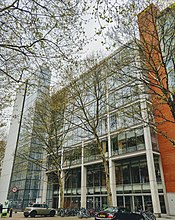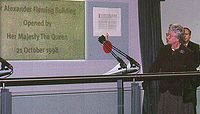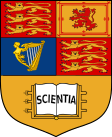 Sir Alexander Fleming Building Sir Alexander Fleming Building | |
| Former names | Imperial College School of Medicine |
|---|---|
| Established | 2001 (2001) |
| Dean | Jonathan Weber |
| Academic staff | 450 |
| Administrative staff | 1,114 |
| Undergraduates | 2,188 |
| Postgraduates | 1,927 |
| Location | London, United Kingdom |
| Campus | South Kensington, Hammersmith, Chelsea and Westminster, St Mary's, Charing Cross, Royal Brompton |
| Colours | |
| Website | www |
The Faculty of Medicine is the academic centre for medical and clinical research and teaching at Imperial College London. It contains the Imperial College School of Medicine, which is the college's undergraduate medical school.
History
Medical teaching at Imperial dates back to the founding of Charing Cross Hospital Medical School in 1823, which was followed by other medical schools including Chelsea and Westminster Hospital Medical School, St Mary's Hospital Medical School, and the Royal Postgraduate Medical School. These preceding medical schools were home to numerous medical researchers, including Sir Alexander Fleming, who discovered penicillin whilst working at St Mary's. St Mary's became part of Imperial in 1988, with the rest merging to form Imperial College School of Medicine in 1995. To accommodate medical activities at South Kensington, the Sir Alexander Fleming building was opened in October 1998, designed by Foster + Partners and costing £65 million.

The Faculty of Medicine was created as part of a college-wide restructuring announced in 2001, taking over research responsibilities from the School of Medicine, which in turn was restricted to only teaching the undergraduate course. The faculty has since had input on biomaterials and bioengineering courses across the college, and been reorganised into 8 academic departments.
In early 2020, immunology research focused on finding a vaccine against SARS-CoV-2 as part of the inter-departmental COVID-19 Response Team, led by the faculty. Under the leadership of professor Robin Shattock, the team made a significant breakthrough by reducing a part of the normal development time to develop the vaccine from "two to three years to just 14 days." By February 2020 the research team was at the stage of testing the vaccine on animals. The faculty's 16 March 2020 report entitled "Impact of non-pharmaceutical interventions (NPIs) to reduce COVID-19 mortality and healthcare demand" was described in a March 17 The New York Times article, as the coronavirus "report that jarred the U.S. and the U.K. to action".
Campuses
The medical school is based at the Sir Alexander Fleming Building on Imperial College Road in South Kensington. It also has many hospital campuses across London with teaching, research and library facilities:
- Hammersmith Hospital
- St Mary's Hospital
- Charing Cross Hospital
- Royal Brompton Hospital
- Chelsea and Westminster Hospital
The faculty also has a presence at its many other associated hospitals across London.
Academics
The faculty is closely linked to the National Health Service, and organises research and clinical teaching through its Imperial College Healthcare NHS Trust hospitals, which is among the largest in the country, and other affiliated hospitals around London. It has also conducted studies on strategies for improving medical teaching and student preparation. The faculty is home to many research institutes, including the Partnership for Child Development and the London Institute of Medical Sciences, which is also a Medical Research Council institute. It is also one of the founding institutions of the Francis Crick Institute, an inter-university medical research centre in London, and the largest biomedical laboratory in Europe.
Department of Brain Sciences
The Department of Brain Sciences is the centre of research and teaching in neuroscience and mental health at Imperial College London. It is one of eight academic departments within the College's Faculty of Medicine and was established following a Faculty reorganisation in 2019. The department also comprises the Centre for Psychedelic Research and leads the UK DRI Centre at Imperial and the UK DRI Care Research & Technology Centre. The department is led by Professor Paul M. Matthews and is centred at Imperial's Hammersmith Campus, with research groups also based at the White City and Charing Cross Campuses.
The department hosts the Multiple Sclerosis and Parkinson's Tissue Bank, a national collection of central nervous system tissue samples donated by individuals with multiple sclerosis (MS), Parkinson's disease and related conditions. The facility is funded by the Multiple Sclerosis Society and Parkinson's UK.
In 2019-20, the department's academic expenditure was £20.8 million, with a research income of £17.7 million.
It comprises three main research Divisions - Neurology, Neuroscience and Psychiatry - in addition to the Centre for Psychedelic Research, the world's first official centre for psychedelic research, led by Professor David Nutt. The department leads two UK Dementia Research Institute (DRI) centres: the UK DRI Centre at Imperial, directed by Professor Paul M. Matthews, and the UK DRI Care Research & Technology Centre, directed by Professor David Sharp in partnership with the University of Surrey.
The department also hosts the Imperial College Brain Tumour Research Centre of Excellence, led by Dr Nelofer Syed.
In the 2021 Research Excellence Framework (REF), Imperial College London was ranked first for psychology, psychiatry and neuroscience.
School of Public Health
The School of Public Health is the faculty's research centre for epidemiology and public health, and includes the Jameel Institute for Disease and Emergency Analytics (established with support from Community Jameel, and led by Neil Ferguson), and the Medical Research Council's Centre for Global Infectious Disease Analysis. The school also offers postgraduate and intercalated undergraduate courses. As of 2019, the school is to move to premises at the college's new White City campus once construction is complete.
Medical school
Main article: Imperial College School of MedicineThe faculty offers a 6-year MBBS course through its School of Medicine, which includes an intercalated year leading to a BSc. The school also offers intercalated programmes for external students, and has partnered with Nanyang Technological University in Singapore to run its Lee Kong Chian School of Medicine, for which it has developed the medical curriculum.
National Heart and Lung Institute

Based across multiple Imperial College campuses, but primarily at the Hammersmith Hospital Campus, the National Heart and Lung Institute had been part of the British Postgraduate Medical Federation, within the University of London. The National Heart and Lung Institute was the highest ranked of Imperial's medical departments in Research Excellence Framework (REF) 2014. It eventually joined Imperial in 1995, becoming part of the then School of Medicine two years thereafter.
Rankings
The faculty ranks 3rd in the world for Clinical and Health in the 2022 Times Higher Education rankings. Tied 11th (with UCSF) in the QS World University Rankings 2018. It is ranked 3rd for medicine in the 2018 Complete University Guide rankings, 11th in the UK by the Guardian University Guide 2018, and 2nd in the UK for research in the latest RAE in 2008, behind Edinburgh.
See also
References
- ^ Gay, Hannah (2007). The History of Imperial College London, 1907-2007. Imperial College Press. pp. 628, 669, 757. ISBN 9781860947087.
- "New Dean of Faculty of Medicine announced". Felix. 25 May 2018. Retrieved 14 December 2019.
- "Statistics Pocket Guide 2018–19" (PDF). Imperial College London. Retrieved 11 December 2019.
- ^ "Campus Information". Imperial College London. Retrieved 11 December 2019.
- "Discovery and Development of Penicillin". American Chemical Society. Retrieved 11 December 2019.
- "A timeline of College developments". www.imperial.ac.uk. Imperial College London. Retrieved 27 December 2018.
- Live! – News: Science Faculties to Re-Merge Archived 31 December 2005 at the Wayback Machine
- "New department structure in the Faculty of Medicine and New Heads of Department". 21 December 2018. Retrieved 14 December 2019.
- Imperial College COVID-19 Response Team (16 March 2020). "Impact of non-pharmaceutical interventions (NPIs) to reduce COVID19 mortality and healthcare demand" (PDF).
{{cite web}}: CS1 maint: numeric names: authors list (link) - ^ "Coronavirus: 'Significant breakthrough' in race for vaccine made by UK scientists". Sky News. Retrieved 6 February 2020.
- "Imperial researchers in race to develop a coronavirus vaccine | Imperial News | Imperial College London". Imperial News. 3 February 2020. Retrieved 6 February 2020.
- Ferguson, Neil M; Laydon, Daniel; Nedjati-Gilani, Gemma; Imai, Natsuko; Ainslie, Kylie; Baguelin, Marc; Bhatia, Sangeeta; Boonyasiri, Adhiratha; Cucunubá, Zulma; Cuomo-Dannenburg, Gina; Dighe, Amy; Fu, Han; Gaythorpe, Katy; Thompson, Hayley; Verity, Robert; Volz, Erik; Wang, Haowei; Wang, Yuanrong; Walker, Patrick GT; Walters, Caroline; Winskill, Peter; Whittaker, Charles; Donnelly, Christl A; Riley, Steven; Ghani, Azra C (16 March 2020). "Impact of non-pharmaceutical interventions (NPIs) to reduce COVID-19 mortality and healthcare demand" (PDF). Imperial College of Science, Technology and Medicine: 20. Retrieved 22 March 2020.
- Landler, Mark; Castle, Stephen (17 March 2020). "Behind the Virus Report That Jarred the U.S. and the U.K. to Action - The New York Times". The New York Times. Retrieved 22 March 2020.
- "Our NHS Trusts". Imperial College London. Retrieved 11 December 2019.
- "Electives and Clinical Attachments, Faculty of Medicine". Imperial College London. Retrieved 14 December 2019.
- "Imperial College Healthcare NHS Trust - Chair, HM Government Public Appointments". Cabinet Office. Retrieved 14 December 2019.
- Mohiaddin, H.; Malik, A.; Murtagh, G. M. (18 April 2019). "Maximizing the acquisition of core communication skills at the start of medical training". Advances in Medical Education and Practice. 10. Dove Press: 727–735. doi:10.2147/AMEP.S212727. PMC 6717721. PMID 31695549. S2CID 203226709.
- Chandrashekar, A.; Mohan, J. (29 January 2019). "Preparing for the National Health Service: the importance of teamwork training in the United Kingdom medical school curriculum". Advances in Medical Education and Practice. 10. Dove Press: 679–688. doi:10.2147/AMEP.S203333. PMC 6709809. PMID 31686942.
- "Partnership for Child Development". London Centre for Neglected Tropical Disease Research. Retrieved 14 December 2019.
- "LMS & Imperial College London". London Institute of Medical Sciences.
- "Our Founders". Crick. Retrieved 11 December 2019.
- Jha, Alok (19 June 2010). "Plans for largest biomedical research facility in Europe unveiled". The Guardian. London. Retrieved 11 August 2010.
- ^ "About us". Department of Brain Sciences | Imperial College London. 22 June 2022. Retrieved 22 June 2022.
- "Departments". Faculty of Medicine | Imperial College London. 22 June 2022.
- "Vision for Medicine". Faculty of Medicine | Imperial College London. 22 June 2022. Retrieved 22 June 2022.
- ^ "Our team". UK DRI Centre at Imperial. 22 June 2022. Retrieved 22 June 2022.
- "Team". UK DRI Care Research & Technology Centre. 22 June 2022. Retrieved 22 June 2022.
- "Professor Paul M. Matthews". Imperial College London. 22 June 2022. Retrieved 22 June 2022.
- ^ "New dementia research centre to pioneer transformative tech for at-home care". Imperial College London. 18 May 2022. Retrieved 22 June 2022.
- "Centre for Vestibular Neurology". Department of Brain Sciences | Imperial College London. Retrieved 22 June 2022.
- "Multiple Sclerosis and Parkinson's Tissue Bank". 22 June 2022. Retrieved 22 June 2022.
- "Statistics guide 2020-21" (PDF). Imperial College London. Retrieved 22 June 2022.
- "Research". Department of Brain Sciences | Imperial College London. Retrieved 22 June 2022.
- "Imperial launches world's first Centre for Psychedelics Research". Imperial College London. 26 April 2019. Retrieved 22 June 2022.
- "People". Centre for Psychedelic Research | Imperial College London. Retrieved 22 June 2022.
- "Professor David Sharp". Imperial College London. Retrieved 22 June 2022.
- "Research Centres of Excellence". Brain Tumour Research. Retrieved 22 June 2022.
- "REF 2021: Psychology, psychiatry and neuroscience". Times Higher Education. 12 May 2022. Retrieved 22 June 2022.
- "Abdul Latif Jameel Institute for Disease and Emergency Analytics". Imperial College London. Retrieved 18 November 2020.
- "MRC Centre for Global Infectious Disease Analysis". UK Research and Innovation. Retrieved 14 December 2019.
- "Study, School of Public Health". Imperial College London.
- "Imperial to set up disease research centre with Saudi support". Financial Times. 15 October 2019. Retrieved 14 December 2019.
- "NTU Singapore scientists convert plastics into useful chemicals using sunlight". eurekalert.org. American Association for the Advancement of Science. 11 December 2019. Retrieved 11 December 2019.
- "Curriculum Development". Imperial College London. Retrieved 11 December 2019.
- "About us". Imperial College London. Retrieved 16 February 2021.
- "Our history and alumni". National Heart and Lung Institute. Retrieved 18 June 2020.
- "Complete University Guide". Complete University Guide. Retrieved 7 May 2015.
- "University League Tables 2018". The Guardian. Retrieved 18 September 2018.
| Imperial College London | |||||||||||
|---|---|---|---|---|---|---|---|---|---|---|---|
| Academics |
|  | |||||||||
| |||||||||||
| Affiliates | |||||||||||
51°29′52″N 0°10′35″W / 51.49778°N 0.17639°W / 51.49778; -0.17639
Categories: